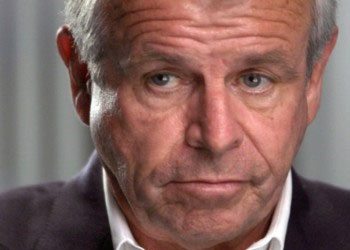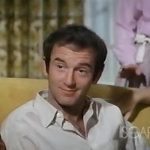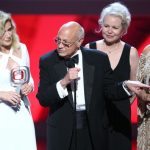Who is William Devane? The decade-long star of Knots Landing, countless television movies and shows and several fine motion pictures doesn’t do many interviews. In the interviews he has granted, he is usually reticent about his craft and the greatest character he created, U.S. Senator and corporate titan Gregory Sumner on Knots Landing. Aloof on that show and (seemingly) aloof in real life, he usually came across as mysterious and even intimidating.
There’s more to William Devane than meets the eye. In this exclusive interview, the man who defined President Kennedy on screen, appeared in Hitchcock’s last hurrah and now leads a gentlemanly life of horse breeding and restaurant proprietorship reveals how he does it.
AS: It’s a pleasure to be talking with you this morning. I have to mention that I’ve been to your restaurant (Devane’s in Palm Springs) and really enjoyed it.
William Devane: I’m glad you liked it. It’s not really my restaurant, it’s more my son’s. But the family owns it.
AS: I even remember what I had … the Zuppa di Clams, the Veal Parmigiana and the Chocolate Cyclone Cake.
Devane: You had it all then.
AS: I tried. How could I resist a restaurant that serves “New York Italian” cuisine?
Devane (laughs): You can’t.
AS: Where are you talking to me today from?
Devane: I have a ranch in Thermal (California).
AS: Very good. Let me ask you first, how did you get onto Knots Landing?
Devane: At one time, whenever the hell it was, they wanted a character to come in and stir up the pot. They brought me in for 8-10 episodes and said we’ll try it for that. Donna Mills came on the show as a female antagonist, about a year before, so now they wanted to have a male antagonist. I was cast as a Senator to shake things up.
AS: So you weren’t brought on to be a regular cast member from the beginning like Kevin Dobson was?
Devane: Well Kevin Dobson came on to Knots because CBS had to fulfill a contractual obligation of his. He had a deal with CBS to do a series; there was a show that he was going to do, as a detective who had a young daughter and that went nowhere. CBS had to fulfill his contract so they put him on Knots Landing. It worked well because Don Murray didn’t want to be on Knots anymore. You’d be surprised how often people get onto shows like that, because the actor has a contract with the network. It actually happens with writers all the time. I’ve been on shows when suddenly writers show up out of nowhere and you wonder why. Then you realize that they had a deal with the network and they’re obligated to get a job. But in any case, that’s how Kevin Dobson got onto Knots Landing.
AS: Then if Kevin was having his contract honored, you must have liked being on the show and the feeling must have been mutual to extend you beyond 8 weeks.
Devane: Oh I really liked it, yeah. Doing a continuing show like that, with the huge growth potential for the character, the possibility of creating an enduring character, it was great. And I have to credit David Jacobs with the opportunities he gave me. He was totally into sharing the creation of characters. David put together a show that told the story of people over many years’ time and that was greatly enjoyable. Though nowadays that is frowned upon.
AS: Why’s that?
Devane: Networks don’t want a show with a continuing story. There’s no backend potential. A show like Knots or any other show that can be called a soap opera does terribly in syndication because if you’re a viewer and you miss a week you don’t know what’s going on. Even though shows like NYPD Blue are soaps in my opinion, but they’re individualized to an extent that you can still follow what’s going on if you miss a week.
AS: Is that why shows like Knots aren’t made anymore?
Devane: Yeah. They might say they want them, but ultimately none of them go in. Though I think The O.C. is doing well, so there’s an example.
AS: Let’s get to some questions submitted for you from fans around the world…
James from London asks
In an interview that Donna Mills did (with Camille Paglia, no less!), she
said that she “always insisted Abby never cried or showed any weakness
except when she was alone. She’d walk into the bathroom to cry.” This
reminds me of you talking in THE KNOTS LANDING BLOCK PARTY about how you very carefully created both a public and private persona for Greg. You
seemed to take it one step further than Abby in that Greg was often as much
of an enigma to the audience as he was to the other characters! That’s what
made him such a compelling character to watch for so long – one of THE most
compelling TV characters ever, in fact. Could you talk a bit more about how
you established and sustained Greg’s private/public persona?
Devane: It’s a Stanislavskian conceit. In a play you have what’s called a “star pause.” You would take that time off the text and involve the audience in your state of mind. My objective (on Knots) was to act what was not there, which is not what television is about. In television that’s why you have so many people who aren’t really talented who are successful at it because it’s all there in front of them, you just act what’s on the page and you’re fine. When you go to a movie, it’s about what’s not being said. I tried to bring that to Greg Sumner. It was always about what’s not being said.
AS: How were you able to do that if television is so script-intensive then?
Devane: We had a lot of cooperation from the writing staff. For example, I wrote the end of the death of Laura scene, the two-parter. Remember that?
AS: Your monologue at the end with the videotape?
Devane: Yes. They had written something else, something a little similar to what I did, actually, not that similar at all now that I remember it. And I just thought that speech I made was much more appropriate for the moment and David agreed.
AS: Do you remember what the original scene was?
Devane: I don’t, but it wasn’t as good. And all of Laura’s stuff, what they wrote originally wasn’t as good and Constance wound up doing that herself. That was all her stuff, reading to the child, because she had children herself and that’s what she would have done. David was the kind of guy who was totally supportive of the actors and instructed the writing staff to trust the actor’s instincts, since after all, it’s the actors playing the character.
Bob from Scotland, UK asks
Bill, I’ve admired your work for so long – not just on ‘Knots’ but other appearances on recent flicks including ‘Hollow Man’ and ‘Space Cowboys’. You always seem to possess a very ‘human’ quality to your performances – bringing the character right down to earth.
Anyway I was lucky enough to receive a script from Kevin Dobson 13 years ago and noticed that all Greg’s lines were amended on some form or another during the actual broadcast. Was this your decision to make last minute changes because all the changes in question were manifestly for the better, and if so, how did the writers feel at having their work tampered with?
Devane: There’s always a certain amount of conflict between the writing staff and the actors. Knots had a large writing staff and they farmed a lot of (the writing) out to others. So the writers would have the dialogue be a certain way until it got to the floor. Once the scene hits the floor, the actors are in charge. But you would notice in the script that’s mentioned that I never altered the story. I altered the script to the point that it allowed the “what’s not being said” to come out, lines here and there.
For instance, I’d like to use colloquial terms. (The writers) would always say, “his land” and I’d say “ground.” Those little things I’d do. There’s a certain possessiveness of writers sometimes. I’ll go work on shows and you’ll see at the top of the script, “Not one word of this can be changed on the floor.” That makes you really want to change it. (Laughs) Writers are not always right however, but then again, I’ve been on shows where the actors have complete control and change everything and it’s terrible.
I would fix other people’s lines if they asked me on occasion. The hard part of writing is the architecture of it, getting the story and structuring it. Not the tweaking of lines.
AS: Sounds like you did a lot more writing than was credited; yet you wrote a few credited episodes as well. Were you hired to do that or did the credits just get placed on there?
Devane: You’re hired to do it. I’d say, “I want to write a couple of episodes this season,” and they’d say fine.
Joshua Slow from Los Angeles asks
In my opinion, the villain you created in Greg Sumner was richer, more textured and three-dimensional than those on the other nighttime soaps. I once read that you told David Jacobs he was the only one on the staff who could write for the Greg Sumner character.
Devane: He created it, so he certainly knew the character. We had problems at one point when Bernie (Lechowick) and Lynn (Latham) came onto the show because they were into being politically correct. And Greg Sumner is not at all politically correct. David Jacobs didn’t mind what I did with the character but then he receded into the background and things changed. Lynn Lechowick didn’t like when I called a woman a “broad.” A glaring example was that Lynn would not want you to smoke. But the cigar was something I used; it was part of who Greg was.
AS: Latham and Lechowick as writers seem to have divided the cast. Michele Lee and Ted Shackelford loved them; John Pleshette and Joan Van Ark hated them. Where do you fit in?
Devane: Make no mistake they were very competent. They knew what they were doing. But Bernie and Lynn were very arrogant so that must have ruffled feathers. When David went into the background Bernie and Lynn were running the show and Joan and John were into diplomacy. Bernie and Lynn didn’t handle things very diplomatically. I didn’t care about that because I’m not a diplomatic person to begin with. I just went along with things and did what I wanted to do because I knew they had to shoot their 12 pages a day. And when they realized that I didn’t alter the text they really didn’t mind what I did.
As time went on it became harder to create story. I mean, they did a great job if they could convince people that Ted Shackelford could convert ocean water into rainwater and make it energy.
AS: Actually, they didn’t write that.
Devane (laughs): No wonder.
Alex Wade from Ferndale, Michigan asks
So what political persuasion was Greg Sumner anyway? It always seemed so ambiguous, as if his views had to be a bastardization of some sort – such as Liberal Republican or Conservative Democrat…
Devane: I think that got a little confused. Personally I’m a left-wing liberal Democrat but Greg Sumner, he’s basically a conservative Republican. That’s how I played him anyway.
AS: I think David Jacobs once said he was a lapsed Kennedy Democrat.
Devane: Maybe. See, David thought he was getting Sam Waterston when he got me. I had played Kennedy and Army guys but they really didn’t know who I was, the person. I was shanty Irish. (AS laughs) This lack of knowledge allowed me to color the character in my own way.
Kay from Milwaukee asks
Did it frustrate you that Knots was ignored by the Emmys? I used to get so mad when Hill Street Blues was nominated again and again while Knots was ignored. Three scenes you did still stand out in my memory–when you were telling Laura that Howard Duff was your real father, when you were talking to Howard Duff’s portrait after he died, and–the best one of all–when you were watching the video Laura made before she died. I still cry when I watch that one! You deserved Emmys each season and I don’t understand why the television academy ignored Knots! What did you and the rest of the cast think of the whole nominating process? Thanks for all the years of great entertainment!
Devane: Ultimately the Emmys are a popularity contest. I remember going to the Golden Globes one year and David was so sure we were going to win. I said, “David, this is the Hollywood Foreign Press Association … they only give it to foreigners.” And I was right; in my category they gave it to the English guy who won two or three years in a row. I don’t remember what show he was on. He was a detective, I think.
AS: The Equalizer?
Devane: Right, that’s it. And the Emmys are all about elitism. At the time (Steven) Bochco’s crew was the elite one out there and they were winning all the awards. But they never beat Knots in the ratings after I got on the show. We were a couple of points ahead of them. Given that, a certain elitism still prevailed and they kept winning awards. If you’re in a soap opera, you’re a second-class citizen. And they don’t give awards to second-class citizens.
And while awards would be nice, I was just glad to be a part of the process and have some scenes I could be proud of. My favorite moment in television was at the end of Laura’s death when I was watching her videotape. It was a single shot. Not a lot of guys can get that material and not a lot can play it.
Laura Avery Sumner from Portland, Oregon asks
In your opinion, who was a better foil for Greg? Laura or Paige? What were the differences between working with Nicollette Sheridan & working with Constance McCashin and if you had to pick only one, which did you prefer?
Devane: There are two different struggles playing off these two characters. (Pauses) Probably more interesting was being opposite Laura since she was a more mature character. Nicollette is one of my best friends; I see her all the time. But that whole story was kind of juvenile. It didn’t interest me as much.
AS: What did you think of Constance leaving the show then?
Devane: That was a very strange time and it all came down to money. The network was pissing and moaning about lopping off some heads to save money. I found that for Greg’s purposes I would have preferred to see her stay on the show. It would have been nice for Greg to eventually grow into a mature relationship with Laura. He was moving toward that already but then took a turn into the juvenile with Paige.
AS: But the passing of Laura opened up a lot of dramatic potential for Greg.
Devane: Oh sure it did. And don’t get me wrong, the character continued and I liked being Greg still. There’s nothing you can do in that situation. That’s the reality. But Constance was really freaked out about it all. And that in turn ruined the reunion when she wouldn’t let her voice be used. What a disaster that movie was.
AS: You mean the scenes when Laura’s videotape was heard.
Devane: Yes, they played it again but it was the voice of a different woman.
AS: They needed Constance’s permission for that? Isn’t that tape the property of CBS or Lorimar?
Devane: It is the property but there’s something in the SAG (Screen Actors Guild) contract that allowed her to withhold permission for her voice. We wanted to use that stuff and they probably shouldn’t have put (the tape) in at that point.
AS: Is that why the reunion was bad then?
Devane: Oh no, that’s only one of the things. It was written by someone who didn’t have anything to do with Knots Landing. They did a shitty job. If they had put their nose to the grindstone they could have done a movie like that every two or three years.
AS: Do you think they’ll ever do another reunion movie?
Devane: No. Too much time has passed. We’re all old now! And I’m not interested in playing someone 47 anymore and getting face work and everything else. I’ve moved on to grandfather roles.
Christine from Germany asks
The season 9 episode “Bouncing Babies” which was written by you is one of my all time favorite Knots episodes. I didn’t like season 9 that much on a whole, I felt the show was going downhill after Laura’s death. In fact I stopped taping the show after Laura’s death but “Bouncing Babies” is an episode that I kept and I have watched it many times since! It’s just so deep, I love the scene at the end where Greg stands there quietly and watches the playhouse burning down.
I wonder what you personally think of Greg’s decision to give Meg to the Mackenzies? I always thought it was the wrong decision, I somehow even think he would have been a wonderful father!
Devane: Karen and Mack had somehow convinced me that they were morally better to raise a child than I was. And I think I was able to get it to a positive place where it worked out. The bottom line construction in a show like that is after a while you can’t be a parent with older children. You start to seem old, and that’s not good. But you bring a small child in and Michele Lee and Kevin Dobson had ten years lopped off their ages overnight.
AS: They did that with Joan Van Ark and Ted Shackelford, too.
Devane: Yes. It’s a conscious decision to give them a young child and that keeps them seeming like they’re 30-something forever, even though they’re 50. It may seem random, but it’s actually very crafty stuff. If you watch Cheers, in 12 years they didn’t age a day.
AS: One of the things I really liked about the progression of Greg was how you let him gray and age naturally. He seemed much more like a real person that way.
Devane: And that’s rare. The business is built on slowing or even stopping the aging process. There are some exceptions. Clint Eastwood is aging beautifully. But someone like Burt Reynolds and others are practically destroying their faces in the amount of work they have. I remember a good story about Lawrence Olivier. He was doing a play called The Entertainer and was wearing elaborate makeup. And Spencer Tracy came to see the show and sat in Olivier’s dressing room for 90 minutes while Olivier had this makeup applied to him. And finally Olivier asked Tracy, “What do you think?” And Tracy replied, “It’s great, but who do you think the audience is going to think you are?” In makeup and plastic surgery it conceals who you are.
Tatianna from Virginia asks
I always wanted to see Greg Sumner and JR Ewing duke it out in some type of business venture. How do you think that Greg would have stacked up against JR? I always believed that Greg was much smarter and had a little more integrity than JR.
Devane: I don’t think in my lifetime I have ever seen an episode of Dallas, so I really don’t know how to answer that question. (Laughs).
AS: Before you started on Knots had you ever seen that show?
Devane: No.
AS: Michelle Phillips said the same thing … I’m sensing a trend here. Are you a TV watcher?
Devane: I try to watch only real things, which basically amounts to C-Span for me. I like real people in real situations. I learn from that.
Annette from San Diego asks
I saw you on The West Wing and I was thrilled because I’ve been into watching KL reruns on Soap Net, and love your character! I was disappointed that you weren’t going to be on the show full time. What sorts of acting projects are you involved in now? And, I have to ask: do you regularly hang out in your restaurant? My sister lives in the desert and we want to come try it out and hopefully catch a glimpse of you!
Devane: That’s very nice to say. I try to go to the restaurant every night early, 6 or 7 o’clock, especially if the (Los Angeles) Lakers are playing. I’m trying to find a character that’s my age and I can sustain week after week. I’d like to do a series. I knew with The West Wing that that wasn’t going to be for very long, that I was just the red herring. I knew they needed to find someone younger than Marty (Sheen) who could take over in a few years. What I would have liked to do on that show was play a secretary of state who has huge personal business interests throughout the world. That, to me, seems to be more in synch with reality.
AS: Especially with this administration.
Devane: Exactly. But you don’t see that on television. The West Wing seems to be feeding the myth about how presidential politics are.
Seaviewer from Australia asks
I understand that you and John Pleshette are old friends. As well as being married to the same woman on Knots, I was wondering if you’ve ever discussed the fact that you played JFK in The Missiles of October and he starred in The Trial of Lee Harvey Oswald.
Devane: Oh that’s funny. John Pleshette and I are very old and good friends. I met him when we were doing a play called McBird, which was wildly successful but also quite controversial. It starred Stacy Keach and was a huge off-Broadway hit that pretty much said that Lyndon Johnson was responsible for the Kennedy assassination. And John and I wrote several scripts together and have been friends for many years.
AS: When did you meet him? The 70s?
Devane: No, no. It was before then. Had to be before Missiles of October, and before McCabe and Mrs. Miller because after McBird I was doing the New York Shakespeare Festival and (Warren) Beatty and (Robert) Altman came to see me there and cast me in McCabe. I’d say, mid-60s? In any case, we’ve been friends ever since.
AS: Did you ever talk about how he played Oswald and you played Kennedy?
Devane: (Laughing) No I never thought of that. I guess when you’re living in Australia you don’t have a lot to do so you think of these things. You know, walking around in the Outback and all.
AS: Well, at the very least, you were both married to the same woman – on television.
Devane: Exactly. And we talked about that.
Fabian Enriquez from Houston asks
Mr. Devane, first off, let me start by saying what a terrific actor you are. I do enjoy watching you on our favorite little show. You stated once that your character wasn’t a victim of anyone or anybody. That’s why I think Greg was loved by so many, good or bad. Greg’s complexity made the character a true original. Many fans were drawn to Greg because he was not an imitation of any other character in the history of television. My question is, did you or any of the other actors step in to stop what was happening during Season 13? Did you have any idea what the writers were doing? Thank you Mr. Devane for indulging us with your answers!
Devane: They ran out of steam on the top side. And suddenly the cost became a very big issue. We went to this schedule when we were in 17 of the 22 episodes or 15 out of 19 or something like that. Everyone in the cast was this way except Michele Lee; since she had been in every episode, they let her be in all the shows for scale. We weren’t offered to do that.
AS: If you were offered would you have done every episode that year?
Devane: Probably not. I only occupied a small amount of airtime anyway and I didn’t see a need to go beyond that. Someone like Mack was there all the time but I was only in 20% of an episode and this was for two reasons: 1) The audience would be waiting to see when I would show up and 2) They would wonder, what would he do when he shows up? It became an interesting creative thing.
Luckily in that 13th season they brought in Ann Marcus, who had been on the show before, and she stabilized things. But the whole schedule was messed up and it made it difficult to tell a story when you were on that kind of rotation.
AS: How did the cast feel during this time? Did it seem crazy?
Devane: I resigned. I had had enough. It had gotten so absurd. And I was offered a deal with ABC. I was going to do a show called Philly Heat, a fireman show, with the guy who wrote Oz, (Tom) Fontana. But that didn’t get picked up so I did Phenom, which was a nightmare. I didn’t like (James L.) Brooks.
AS: Would you say the reason the show ended is because you left?
Devane: It would be egotistical for me to say that. I left Knots Landing because I didn’t want to go in the toilet with this shit. The problem really comes down to the writing and trying to come up with good stories and most of us just said, “we’ve done good work and let’s be proud of that and not have the show’s legacy ruined.” The same issue is happening on a show like Everybody Loves Raymond now, which is in its eighth year and struggling to come up with good stories. It’ll be interesting to see how they do. The bottom line is, it starts with the writers and ends with the writers.
AS: But wasn’t it economic? Didn’t the show run out of money?
Devane: It was economic. It was all of those things. I think it was Ronald Reagan who said, “A love affair is like a cigar; once it goes out it’s impossible to relight it.”
AS: Good line. Moving right along…
Ginger Christopher from Harriman, Tennessee asks
If you could have been any character on the show other than Greg, who would it have been and why?
Devane (Pauses): I don’t know …I liked playing Greg. But … if I had to choose, I’d rather be Nicollette’s character. (Laughs) That could have been fun. I certainly was not interested in any of the other male characters.
AS: Some other questions come to mind. Which storyline was your favorite?
Devane: I liked the Laura story.
AS: Anything in particular or the whole thing?
Devane: The whole thing. Constance is very smart and very quick so it was a joy to work with her. Our dynamic had elements of Tracy and Hepburn in it. At times we were able to do sophisticated comedy and I would have liked to do more of that. Not enough for my tastes, but when we did it, it worked well.
AS: I thought the story of the death of Sumner’s daughter Mary Frances was one of the great underrated arcs in the series. I learned so much about your character through your facial expressions and sparse words during that sequence. It still stirs me.
Devane: I appreciate that. A BBC Miniseries is where we stole (that story) from. I especially liked all the people from Greg’s past coming back to haunt him. That’s where I got to know Stacy Galina, who was a ballerina and a New York-trained actress. Very bright girl. Later on when she returned as my niece I wrote all those scenes where we talked about sex.
James from London also asks
I wonder how you felt about Greg being the focus of KNOTS LANDING’s response to the LA riots in its final season. It seemed to me that the chief motivator for the story, on both sides of the camera, was white man’s guilt. Just as Greg, a formerly liberal politician, felt the need to make amends for turning his back on his own ideals, so KNOTS, as a supposedly forward thinking programme, felt compelled to make up for its sin of omission, (that is – avoiding the issue of race throughout its run). When Greg eventually admits that he doesn’t belong “down there” on the front line, its as though KNOTS is also admitting its limitations in dealing with this issue. Do you agree? Disagree? Or do you think I should just get a life?
Devane (laughs): I agree. I play a lot of charity golf, and a lot of it’s in the South. And often I’ll have a lot of black people come up to me and tell me how much they loved the show. They are totally into it on every level, everywhere I go. And they are so exuberant! Much more than white people. You name it: restaurants, airports – “Hey Greg Sumner!” someone will call out and they’ll come up and hug me!
My point is that they get it; they get the show and what I was doing on every level. Knots Landing appealed to people across the board, white or black. The show, however, brought in a black couple at one point. That’s done to appease the Jesse Jacksons of the world, for no reason. I don’t know if television is the place to correct inequities in race. That should be done in the political arena or other places. Human drama should transcend color lines. Certainly television did a great job with The Cosby Show, great progress was made there. But I don’t think Knots Landing missed the boat in terms of race. As it stood, you had to cram a black person into the cul-de-sac after a while, and it just wasn’t necessary.
I grew up in an Irish neighborhood, and across the street there was an Italian neighborhood and there was a Polish neighborhood. And I’m not against integration, but the way it was done on Knots seemed like an effort to appease something.
AS: What did you think of the L.A. riots story then? Must have seemed phony to you.
Devane: It’s one of the reasons I left. It didn’t help, that’s for sure. Ted turning the seawater into fresh water or whatever the hell he did was better.
AS: At the end your last promising story, but one that didn’t pan out, was the biography Val was going to write of you. Of course she left the show so that turned into nothing.
Devane: Yeah I know. That was a shame.
AS: Did you notice that you were hardly in any scenes with her in your ten years on the show?
Devane: I noticed. They didn’t put me with her and so I didn’t even know what her character was doing most of the time. I found that as Greg, it made my character more believable if I stayed in character and didn’t really follow stories that didn’t involve me. And Joan fit into that category. But it’s unfortunate because Joan is the person you want to be working with. She gives 150% all the time.
AS: Could you have seen yourself with Val?
Devane: No. Her character was such a sexual victim that it wouldn’t have made sense.
Chris Sumner Matheson from San Antonio asks
In 1977 you starred in the wonderful revenge themed film, “Rolling Thunder,” along with Tommy Lee Jones. I watched the film on your name alone and was thoroughly impressed with your excellent portrayal of a Vietnam POW. I was wondering what your feelings were on the film. Do you remember anything exciting about the making of the film?
Devane: It was fun. I’ve known Tommy Lee (Jones) all these years since that. Ultimately I wasn’t up for being a star in movies. I view it as a failed opportunity. I was not sophisticated enough to be a star, but that movie could have pushed me to a new level. That’s what you do when you get a role like Rolling Thunder. And when you don’t capitalize on opportunities you realize that ultimately Harrison Ford has a jet, and I don’t.
What also happens is that you don’t get the hot scripts. When a great script comes out it’s not going to sift its way down to you… Hold on a sec. (Pauses; an imperceptible woman’s voice is heard). What time’s your game? … (Woman’s voice) … Oh … (woman’s voice) … OK I’ll be there. (To AS) Sorry about that. A friend of mine is going to be playing polo in an hour and I said I’d watch the game.
AS: She’s playing polo on your ranch?
Devane: Well my ranch is really a facility for polo trainers and players. Here people breed horses and can play in polo matches. It’s divided up into several farms. I don’t operate all the farms.
AS: Are you the landlord then?
Devane: I’m not the landlord; I’m the developer. We have 300 horses here on 15 ranches and a homeowner’s association. All devoted to polo.
AS: How many acres is the ranch total?
Devane: It’s a 140-acre piece and I live on one of the 5-acre sections. It’s like buying a house on a golf course, same principle. So what was I saying? Oh yeah, Rolling Thunder. When you miss those opportunities to go to the next level in movies, it’s unfortunate. For example, when a good script comes out Tom Cruise is the first choice for it, then it goes to whoever and whoever. But a script like that will only go to five people and then it just will go on the shelf and won’t get made. You’d think they would keep looking until it gets made but Hollywood doesn’t work that way.
AS: I don’t understand what you mean by not being sophisticated enough. Do you mean you didn’t network well enough?
Devane: It’s that and I didn’t understand the business enough to choose the right projects. When I talk to students I tell them that your first year out there are 1000 people going for 100 parts. And the people who get them are the 100 smartest guys. The next year there are 10 parts available and the 10 best are not going to get the roles but the 10 smartest. That’s what it’s about. And the ten smartest are the ones who make it to the top and they stay there.
AS: I wouldn’t frame everything in the context of being a movie star, though. You’ve been extremely successful in television and have outlasted a lot of “movie stars.”
Devane: In television the opposite happens. They don’t want my baggage. They want a new face at 62. It’s all about being new in TV. I was up for a soap opera recently, and it was the best one I had ever read. However they said to me, “This is going to be perceived as a soap opera if you’re in it.” But that’s what it was! They reworked it and it’s going to come out with a much younger cast.
AS: What is it called?
Devane: I probably shouldn’t say.
AS: Have you taught a course? Or just done seminars?
Devane: Sometimes someone will call me up and say, “Will you talk to the class?” I tell them the best education you can get for acting is to go to Harvard Business School. Because you’re the commodity and there they will teach you how to market yourself. People need to understand the business, it’s a wonderful business, but you have to be prepared.
AS: Do you keep in touch with anyone from the cast?
Devane: I really don’t. I run into Nicollette; we see each other a lot. She’s a very horsey person, into the horses, and that brings us together.
AS: It would be nice if someone did a 25th anniversary special for Knots this year. I guess that would have to be in the works already but the 25th anniversary is this December, you know.
Devane: Oh I doubt that would happen. Did you watch the CBS 75th anniversary special?
AS: Yes.
Devane: Did you notice anyone there?
AS: Well actually Donna, Michele and Joan were there.
Devane: They were? Nicollette and I weren’t even invited! They have no interest in their past. It’s like tearing down Carnegie Hall. I mean, Knots was what, like the second or third longest running show of all time and yet do you ever hear about it? Dallas is talked about ‘til they’re blue in the face but Knots Landing is ignored.
AS: That’s true. But there’s still a devoted following (for Knots) and new people are coming to watch it.
Devane: Yeah I know it plays on the soap channel. The girls in the restaurant watch it during the day and always tease me about it. “We saw what you did today!” That sort of thing. I was visiting my grandkids recently and they had the show on and we watched an hour episode. And I’m sitting there thinking, “I don’t remember anything about this episode – and I’m in it!” How the hell does this happen? I thought. But the 2-year-old and 4-year-old are pointing to the screen and saying, “Grandpa!”
AS: Do you remember what the episode was about?
Devane (Laughing): I really don’t.
AS: I’m glad the reruns continue on Soap Net and that you were in so many of them. I have to thank you for all the great work you did. Watching the show as a teenager, especially for a show that had such a female influence, I always looked up to you, even as a type of role model. I learned a lot about human behavior from you and I think I speak for everyone when I thank you for that.
Devane: Thank you very much. That means a lot. Knots Landing has a lovely place in my heart, in the lovely past. I couldn’t have done it without David’s help.
AS: It’s been a pleasure speaking with you today.
Devane: Yes, for me as well. This is painless and if you’d want to revisit it in the future let me know.







